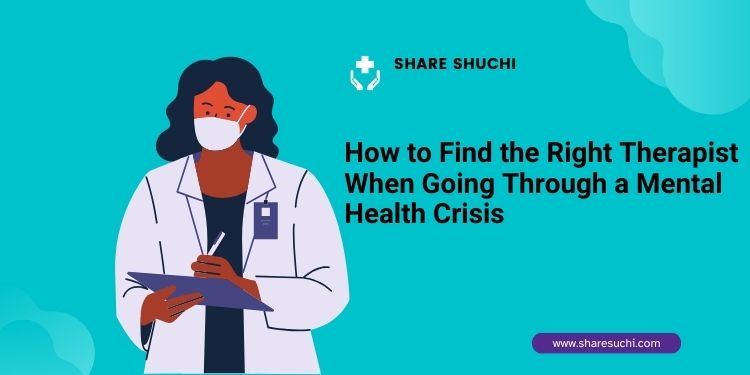The main question will be how to find the right therapist When going through a mental health crisis. We know A mental health crisis can be very confusing and upsetting. Navigating these difficult times might be greatly aided by selecting the appropriate therapist.
This guide will give you concrete recommendations for where to get the assistance you require.
Table of Contents
1. Acknowledge the Need for Help
Acknowledging your need for assistance is the first step in selecting the ideal therapist. This is a bold and important choice.
A mental health crisis may show up as extreme worry, despair, panic attacks, or excessive stress, among other symptoms. It’s critical to realize that getting help from a professional is a proactive and constructive step toward recovery.
2. Identify Your Needs and Preferences
Think about what you need from therapy before you begin your search. Consider this:
- What are the specific issues I’m dealing with?
- Do I prefer a therapist of a certain gender or age?
- Am I comfortable with in-person sessions, or would I prefer online therapy?
- What therapeutic approaches have I found helpful in the past, if any?
3. Research Different Types of Therapists
Professionals in mental health come in several varieties, each with their particular areas of expertise. Typical varieties include some of the following:
- Psychiatrists: Medical doctors who can prescribe medication.
- Psychologists: Professionals with doctoral degrees who specialize in therapy and psychological testing.
- Licensed Professional Counselors (LPCs): Therapists who provide talk therapy and coping strategies.
- Clinical Social Workers (LCSWs): Therapists who provide counseling and connect clients with community resources.
Understanding the differences can help you decide which type of professional might best suit your needs.
4. Ask for Recommendations
Referrals from friends and family can be quite helpful. Ask dependable family members, friends, or medical professionals about their experiences working with therapists.
Ask your primary care physician for a recommendation if you feel safe doing so. Suggestions can also be obtained from mental health-related social media groups and online forums.
5. Utilize Online Directories
Several trustworthy internet directories might assist you in locating licensed therapists:
- Psychology Today: Offers a comprehensive directory of therapists, including their specialties, credentials, and client reviews.
- Therapist Finder: Provides a searchable database of licensed therapists.
- GoodTherapy: Lists therapists who adhere to certain ethical standards and practices.
6. Verify Credentials and Experience
Make sure the therapist you are thinking about is qualified and has handled problems similar to yours before.
The majority of internet directories offer thorough biographies, but you may also verify their qualifications by contacting state licensing authorities or trade associations.
7. Schedule Consultations
Many therapists provide a first consultation at no cost. You can talk about your worries, ask questions, and determine whether you feel comfortable with the therapist during this meeting.
A few inquiries to think about posing are:
- What is your experience with my specific issue?
- What therapeutic approach do you use?
- How long do you expect therapy to last?
- What are your fees and do you accept my insurance?
8. Evaluate Your Comfort Level
Throughout your consultation, be mindful of your feelings. You must have a strong therapeutic alliance for treatment to be effective, therefore it’s critical that you feel listened to, appreciated, and understood.
It’s alright to keep looking if something doesn’t feel right, so follow your gut.
9. Consider Logistics
Practical factors like price, location, and availability are also crucial. Make sure the therapist’s rates are within your means and that their office hours coincide with your schedule.
Check if your insurance is in-network if you have it to reduce your out-of-pocket costs.
10. Take the First Step
After determining which therapist best suits your needs, move on by setting up an initial appointment.
Although entering therapy can be intimidating, doing so is a crucial step in enhancing your mental well-being.
Conclusion
During a mental health crisis, choosing the correct therapist is a personal process that takes patience and time.
You can locate a specialist who will help you get through this trying period by being aware of your needs, considering your options, and following your gut.
Recall that asking for assistance is a show of strength, and finding the proper therapist can have a significant impact on your healing process.
FAQs.
How can therapy help during a mental health crisis? –
Therapy is a secure setting where you can discover coping mechanisms, examine your emotions, and get support. A qualified therapist can support you while you work toward recovery, understand your obstacles, and manage your symptoms.
Should I schedule a consultation with a potential therapist?
Indeed, a lot of therapists provide a no-cost initial consultation. You can talk about your worries, ask questions, and determine whether you feel comfortable talking to the therapist during this meeting.
How important is it to feel comfortable with my therapist?
Effective therapy requires that you and your therapist feel at ease with each other. Successful treatment depends on the therapeutic relationship, so follow your gut and make sure you feel heard and valued.
What logistical factors should I consider when choosing a therapist? –
Think about the therapist’s availability, location, and cost. To prevent large out-of-pocket expenses, make sure their office hours work with your schedule and find out whether they take your insurance.
What should I do if I don’t feel comfortable with the therapist I choose? –
If you don’t sense a connection with your therapist, it’s acceptable to look elsewhere. It’s crucial to find the appropriate fit, and if necessary, it’s quite okay to go for another expert.


